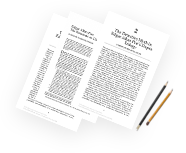Module Overview19.html
Professional Application Reflection
Throughout this course, you have gained a deeper understanding of the usefulness of psychological testing. Throughout your career path, you will be sure to come across psychological testing and assessments in your day-to-day work. You may find yourself administering tests, interpreting results, reviewing a psychological report, making decisions that are informed by testing, or helping a client or student better understand the results of a test. As you have learned, testing is present in a wide range of settings. Human resources departments use testing to select employees and measure job performance. Clinicians use testing to inform treatment, identify diagnoses, and make recommendations. Schools use testing as a measure of intelligence and academic achievement. The legal system uses testing to provide insight about individuals and their current state of mind. Regardless of the field you choose, you will find the presence of psychological testing. Completing this course should provide you with a foundation to understand the usefulness and meaning of the assessments you encounter in your career. state o




